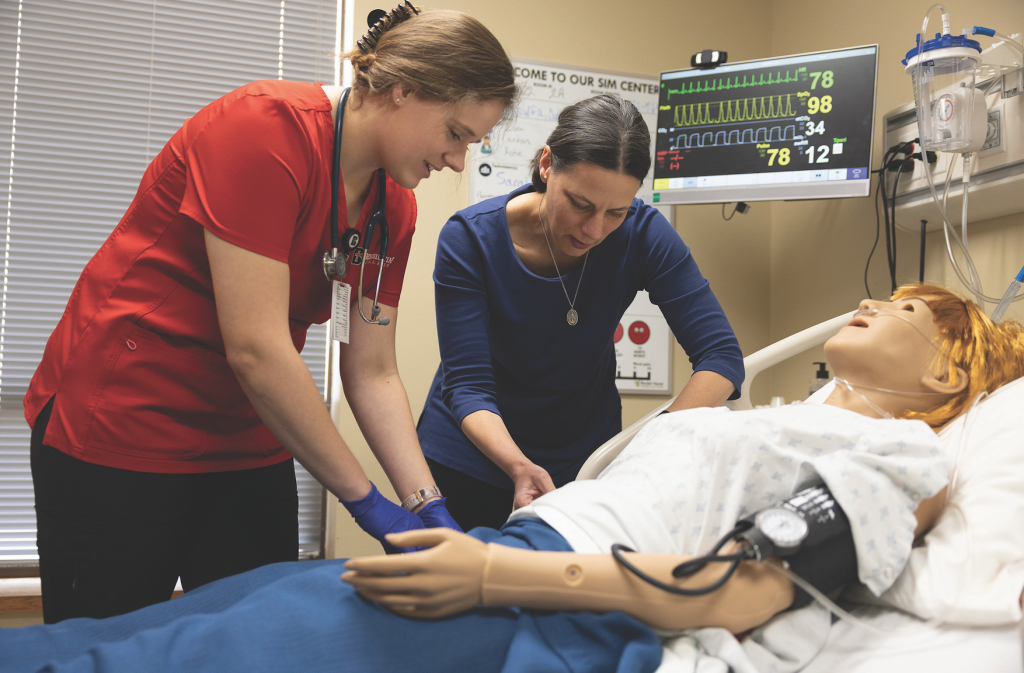
by Susan McCabe
Special to The Leaven
KANSAS CITY, Kan. — Training to be a nurse is a challenge in itself, given the nature of the work. But add a global pandemic to the mix, and the training that today’s nursing students receive just got that much more rigorous.
Two local Catholic colleges recognized the impact the pandemic would have on training the next generation of nurses and quickly made adjustments to prepare students for a new normal. Although the schools cannot change the curriculum without approval from the nursing faculty, college curriculum committee and Kansas State Board of Nursing (KSBN), their delivery of clinical experiences has changed — a critical part of a nursing education, according to Jackie Harris, DNP, APRN, director of the department of nursing at Benedictine College in Atchison.
“Our faculty members have been working hard to meet the needs of our students. We have lost clinical sites because they have become COVID units. It has been difficult to find qualified clinical nursing instructors since the pay for nurses in the hospital have increased significantly. Competing with these wages is a challenge,” Harris said.

To address the shortage of clinical sites, Benedictine has increased its simulations and hired an adjunct faculty member to help with increased lab hours. Similarly, Donnelly College in Kansas City, Kansas, has added more classroom simulcasts so that instruction can flow from room to room and allow for in-person lessons and clinical simulations, said Patty Palmietto, MSN, RN, Donnelly’s director of nursing.
Over the course of the pandemic there have been other challenges, too, including a shortage of COVID tests, N95 masks and other equipment, as well as illness among the students who contracted the virus. Additionally, nursing schools have faced the same challenges to vaccinate their population that all institutions have dealt with.
But there have been some silver linings, said Palmietto.
“We have become very involved with the Unified Government [of Wyandotte County and Kansas City, Kansas] and have taken over some of their vaccination clinics starting in May of 2021 to help ease the stress of their normal vaccination people,” Palmietto said. “We also have given vaccinations and COVID-19 tests from Donnelly to the community, and the nursing department took over COVID-19 screenings for Bishop Ward High School when the students were able to return to school.”

For nursing students, such as Benedictine College senior Sarah Daskiewicz, there have been personal challenges as well.
“It’s not uncommon that people will ask me what nursing school is like [amid] the COVID-19 pandemic. I never quite know how to answer this question because I never had the chance to experience nursing before the pandemic,” Daskiewicz said.
But she admits that she experiences the stress of the “more highly regulated clinical experiences,” due to COVID, and there’s always the fear of getting sick.
But perhaps the greatest challenge is all about her patients: “the decreased ability to truly connect with others face-to-face, without masks blocking our smiles.”

However, it has also made Daskiewicz appreciate and admire those who have fought for students to obtain clinical placements. Nursing school in a pandemic has not been easy, she said, but the struggle has provided her with a renewed opportunity to redefine why she is studying nursing.
“I believe that those of us who graduate from nursing school at this time will be equipped with uniquely shaped skills of perseverance and determination,” she said. “It is my hope that we can take our experiences as students and allow them to form us as nurses who are unafraid to let the craziness of the outside world affect our patient care and help us focus on what is important in our individual interactions with our patients and with our team.”
Our communities will need more nurses, as more leave the profession, said Stephanie Sisk, APRN, a nurse with Stormont Vail Health in Topeka. In fact, more nurses who were employed in other roles are now being asked to return to bedside, patient care, she said.
“We’ve lost plenty of nurses to retirement or to burnout,” Sisk said. “Now that we’re in [another] round of the pandemic, our staffing crisis is extremely serious. It’s going to take years to come back to a place of ‘good’ staffing.”

Moving forward, nursing schools will continue to adjust, Palmietto said. She believes that even if the pandemic ended today, new protocols and practices have emerged that will benefit staff and patients in the years ahead.
That’s not to say the schools don’t need resources — one of which is prayer, Harris said.
“All health care workers need your prayers — we are exhausted. Parishioners can support health care workers by acknowledging their sacrifices and provide a listening ear to hear our struggles,” Harris said.
“We need more nurses. We need nurses educated by Catholic schools,” she added. “Ethical issues will get more complicated. We need nurses to support Catholic values and advocate for those patients who are unable to advocate for themselves. It is challenging to be a nurse, but it is rewarding.”
It’s a sentiment echoed by Palmietto.
“Health care workers are very similar to Catholics in that we rally around each other, we pick each other up, we pray together, we get through it and meet on the other side,” Palmietto said.






